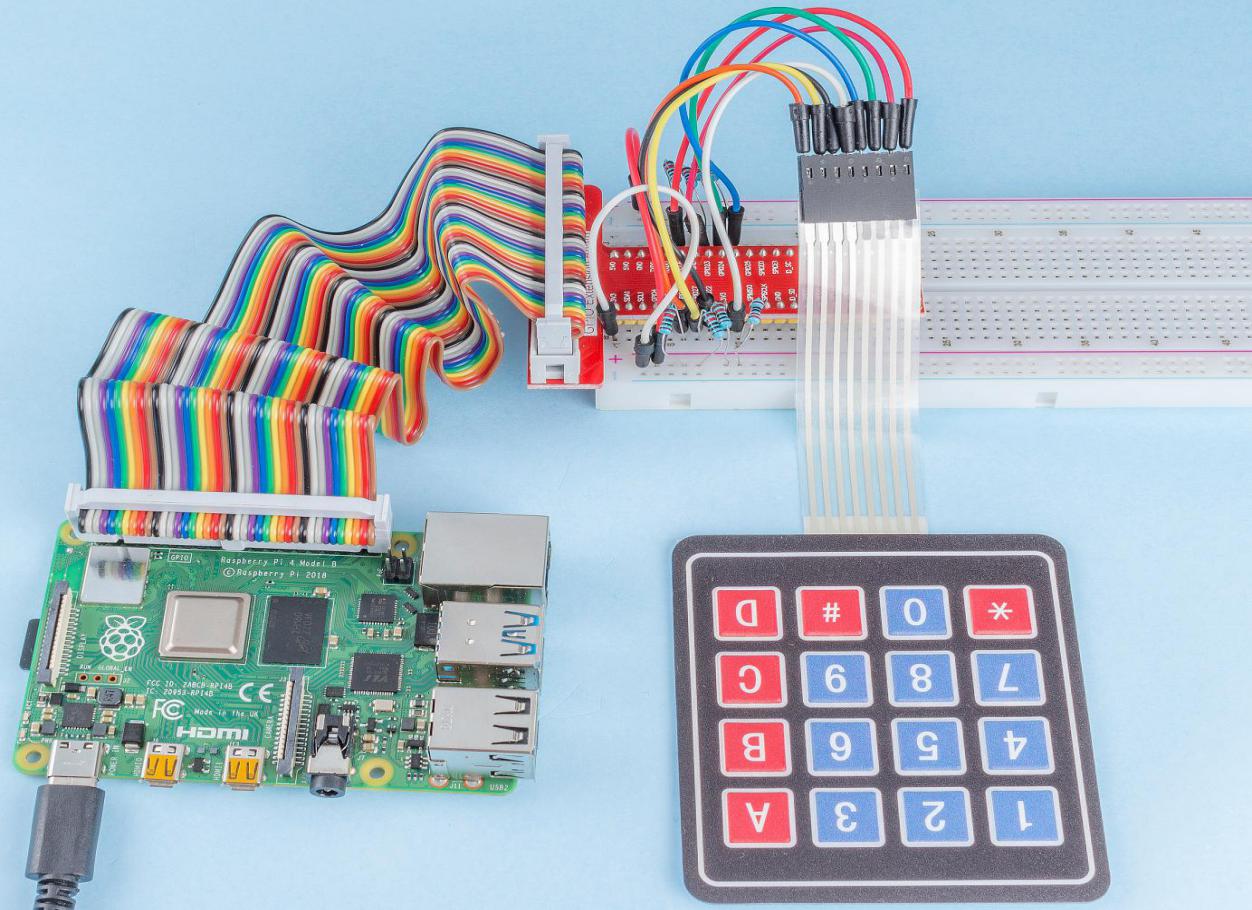Note
Hello, welcome to the SunFounder Raspberry Pi & Arduino & ESP32 Enthusiasts Community on Facebook! Dive deeper into Raspberry Pi, Arduino, and ESP32 with fellow enthusiasts.
Why Join?
Expert Support: Solve post-sale issues and technical challenges with help from our community and team.
Learn & Share: Exchange tips and tutorials to enhance your skills.
Exclusive Previews: Get early access to new product announcements and sneak peeks.
Special Discounts: Enjoy exclusive discounts on our newest products.
Festive Promotions and Giveaways: Take part in giveaways and holiday promotions.
👉 Ready to explore and create with us? Click [here] and join today!
2.1.8 Keypad¶
Introduction¶
A keypad is a rectangular array of buttons. In this project, We will use it input characters.
Required Components¶
In this project, we need the following components.
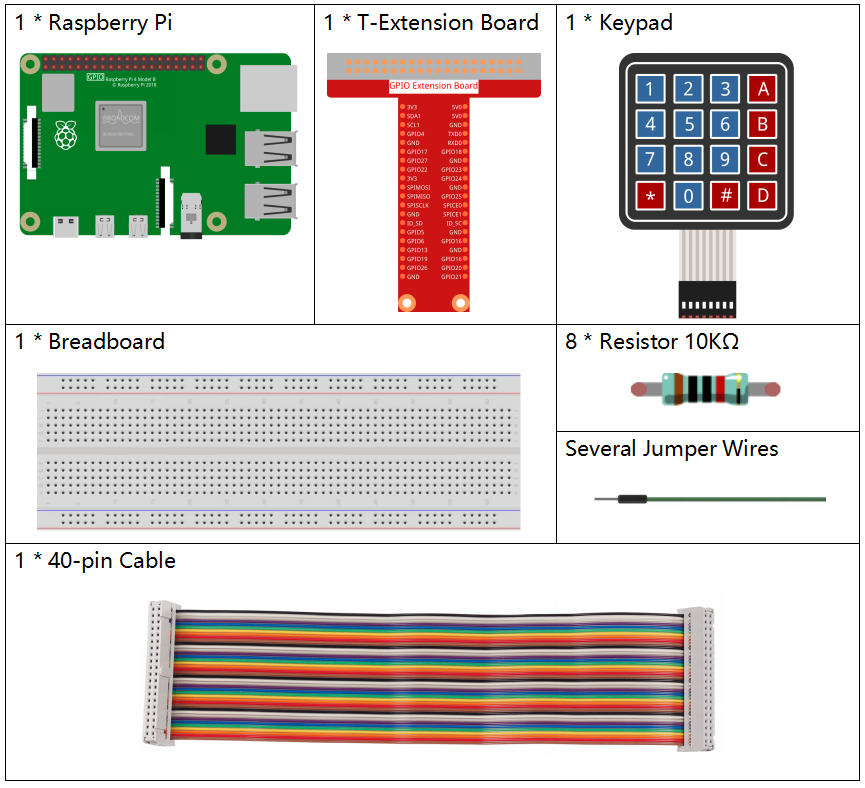
It’s definitely convenient to buy a whole kit, here’s the link:
Name |
ITEMS IN THIS KIT |
LINK |
|---|---|---|
Raphael Kit |
337 |
You can also buy them separately from the links below.
COMPONENT INTRODUCTION |
PURCHASE LINK |
|---|---|
- |
Schematic Diagram¶
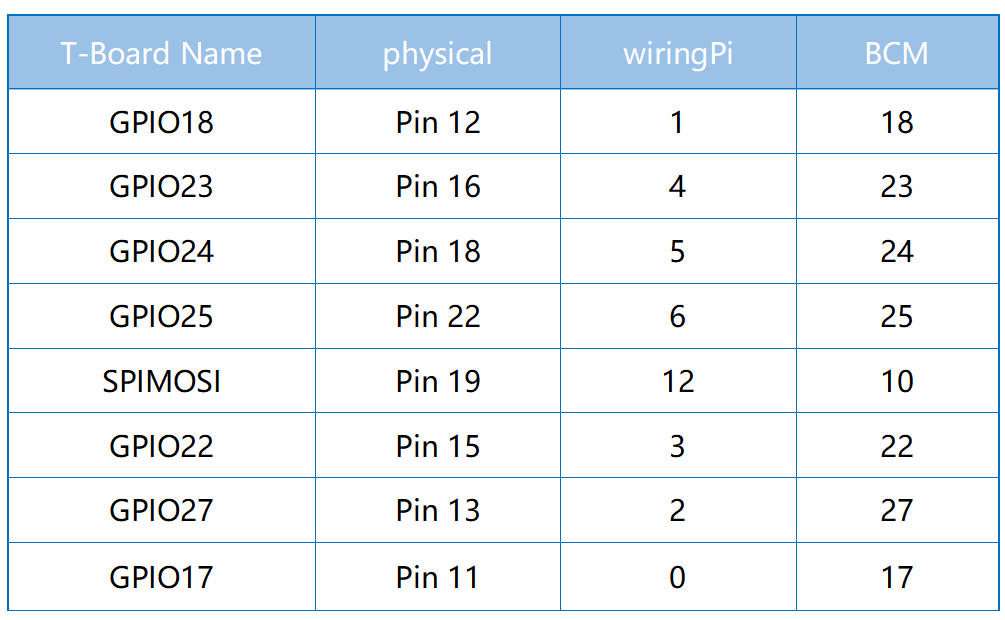
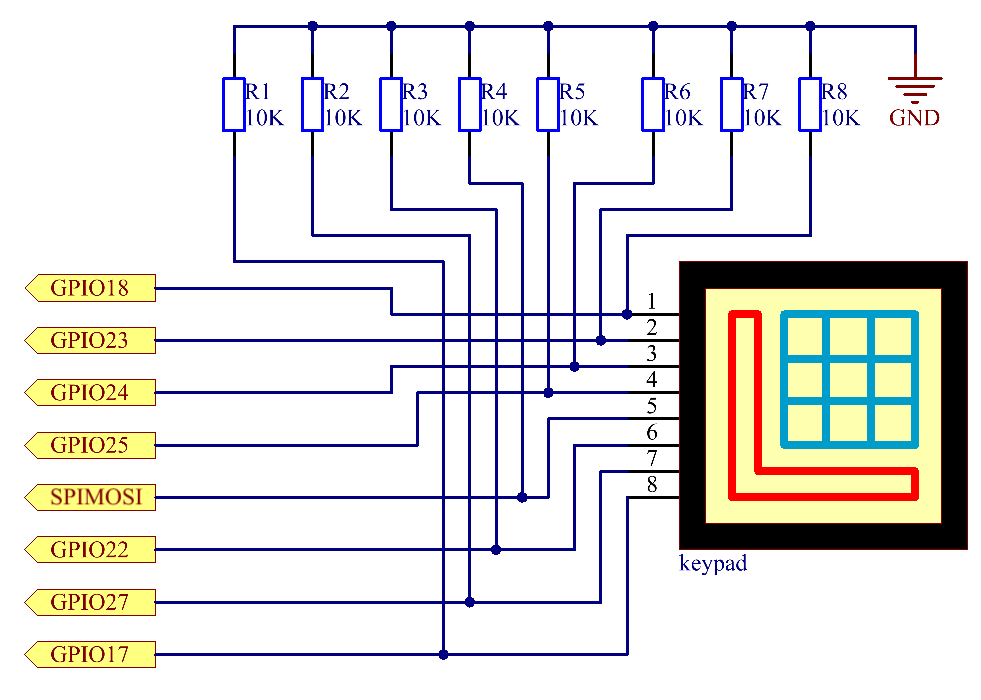
Experimental Procedures¶
Step 1: Build the circuit.
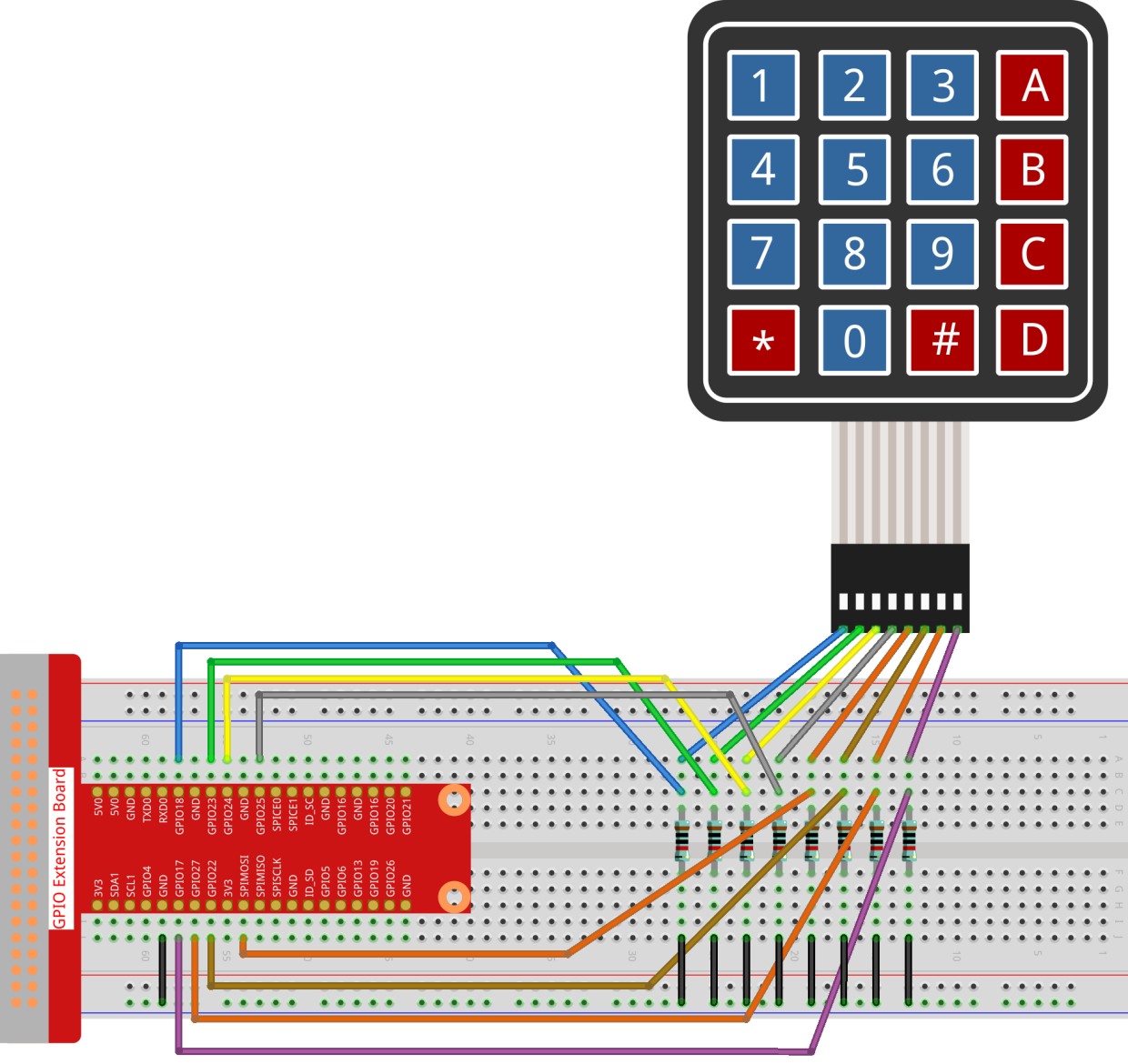
Step 2: Open the code file.
cd ~/raphael-kit/c/2.1.8/
Step 3: Compile the code.
gcc 2.1.8_Keypad.cpp -lwiringPi
Step 4: Run.
sudo ./a.out
After the code runs, the values of pressed buttons on keypad (button Value) will be printed on the screen.
Note
If it does not work after running, or there is an error prompt: "wiringPi.h: No such file or directory", please refer to Install and Check the WiringPi.
Code
#include <wiringPi.h>
#include <stdio.h>
#define ROWS 4
#define COLS 4
#define BUTTON_NUM (ROWS * COLS)
unsigned char KEYS[BUTTON_NUM] {
'1','2','3','A',
'4','5','6','B',
'7','8','9','C',
'*','0','#','D'};
unsigned char rowPins[ROWS] = {1, 4, 5, 6};
unsigned char colPins[COLS] = {12, 3, 2, 0};
void keyRead(unsigned char* result);
bool keyCompare(unsigned char* a, unsigned char* b);
void keyCopy(unsigned char* a, unsigned char* b);
void keyPrint(unsigned char* a);
void keyClear(unsigned char* a);
int keyIndexOf(const char value);
void init(void) {
for(int i=0 ; i<4 ; i++) {
pinMode(rowPins[i], OUTPUT);
pinMode(colPins[i], INPUT);
}
}
int main(void){
unsigned char pressed_keys[BUTTON_NUM];
unsigned char last_key_pressed[BUTTON_NUM];
if(wiringPiSetup() == -1){ //when initialize wiring failed,print message to screen
printf("setup wiringPi failed !");
return 1;
}
init();
while(1){
keyRead(pressed_keys);
bool comp = keyCompare(pressed_keys, last_key_pressed);
if (!comp){
keyPrint(pressed_keys);
keyCopy(last_key_pressed, pressed_keys);
}
delay(100);
}
return 0;
}
void keyRead(unsigned char* result){
int index;
int count = 0;
keyClear(result);
for(int i=0 ; i<ROWS ; i++ ){
digitalWrite(rowPins[i], HIGH);
for(int j =0 ; j < COLS ; j++){
index = i * ROWS + j;
if(digitalRead(colPins[j]) == 1){
result[count]=KEYS[index];
count += 1;
}
}
delay(1);
digitalWrite(rowPins[i], LOW);
}
}
bool keyCompare(unsigned char* a, unsigned char* b){
for (int i=0; i<BUTTON_NUM; i++){
if (a[i] != b[i]){
return false;
}
}
return true;
}
void keyCopy(unsigned char* a, unsigned char* b){
for (int i=0; i<BUTTON_NUM; i++){
a[i] = b[i];
}
}
void keyPrint(unsigned char* a){
if (a[0] != 0){
printf("%c",a[0]);
}
for (int i=1; i<BUTTON_NUM; i++){
if (a[i] != 0){
printf(", %c",a[i]);
}
}
printf("\n");
}
void keyClear(unsigned char* a){
for (int i=0; i<BUTTON_NUM; i++){
a[i] = 0;
}
}
int keyIndexOf(const char value){
for (int i=0; i<BUTTON_NUM; i++){
if ((const char)KEYS[i] == value){
return i;
}
}
return -1;
}
Code Explanation
unsigned char KEYS[BUTTON_NUM] {
'1','2','3','A',
'4','5','6','B',
'7','8','9','C',
'*','0','#','D'};
unsigned char rowPins[ROWS] = {1, 4, 5, 6};
unsigned char colPins[COLS] = {12, 3, 2, 0};
Declare each key of the matrix keyboard to the array keys[] and define
the pins on each row and column.
while(1){
keyRead(pressed_keys);
bool comp = keyCompare(pressed_keys, last_key_pressed);
if (!comp){
keyPrint(pressed_keys);
keyCopy(last_key_pressed, pressed_keys);
}
delay(100);
}
This is the part of the main function that reads and prints the button value.
The function keyRead() will read the state of every button.
KeyCompare() and keyCopy() are used to judge whether the state of a
button has changed (that is, a button has been pressed or released).
keyPrint() will print the button value of the button whose current level
is high level (the button is pressed).
void keyRead(unsigned char* result){
int index;
int count = 0;
keyClear(result);
for(int i=0 ; i<ROWS ; i++ ){
digitalWrite(rowPins[i], HIGH);
for(int j =0 ; j < COLS ; j++){
index = i * ROWS + j;
if(digitalRead(colPins[j]) == 1){
result[count]=KEYS[index];
count += 1;
}
}
delay(1);
digitalWrite(rowPins[i], LOW);
}
}
This function assigns a high level to each row in turn, and when the key
in the column is pressed, the column in which the key is located gets a
high level. After the two-layer loop judgment, the key state compilation
will generate an array (reasult[]).
When pressing button 3:
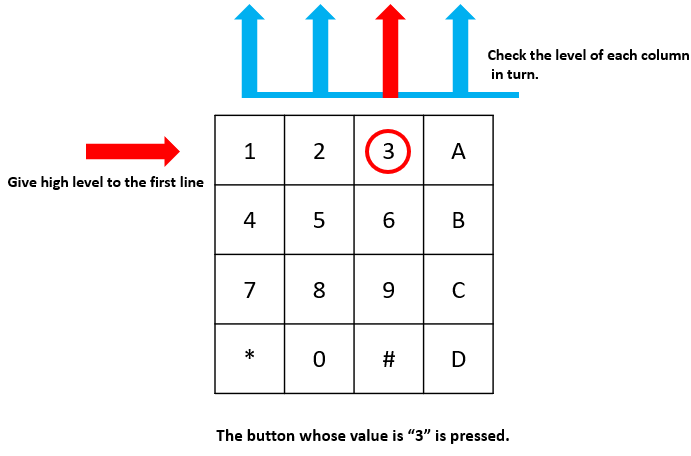
RowPin [0] writes in the high level, and colPin[2] gets the high level.
ColPin [0], colPin[1], colPin[3] get the low level.
This gives us 0,0,1,0. When rowPin[1], rowPin[2] and rowPin[3] are written in high level, colPin[0]~colPin[4] will get low level.
After the loop judgment is completed, an array will be generated:
result[BUTTON_NUM] {
0, 0, 1, 0,
0, 0, 0, 0,
0, 0, 0, 0,
0, 0, 0, 0};
bool keyCompare(unsigned char* a, unsigned char* b){
for (int i=0; i<BUTTON_NUM; i++){
if (a[i] != b[i]){
return false;
}
}
return true;
}
void keyCopy(unsigned char* a, unsigned char* b){
for (int i=0; i<BUTTON_NUM; i++){
a[i] = b[i];
}
}
These two functions are used to judge whether the key state has changed, for example when you release your hand when pressing ‘3’ or pressing ‘2’, keyCompare() returns false.
KeyCopy() is used to re-write the current button value for the a array (last_key_pressed[BUTTON_NUM]) after each comparison. So we can compare them next time.
void keyPrint(unsigned char* a){
//printf("{");
if (a[0] != 0){
printf("%c",a[0]);
}
for (int i=1; i<BUTTON_NUM; i++){
if (a[i] != 0){
printf(", %c",a[i]);
}
}
printf("\n");
}
This function is used to print the value of the button currently pressed. If the button ‘1’ is pressed, the ‘1’ will be printed. If the button ‘1’ is pressed and the button ‘3’ is pressed, the ‘1, 3’ will be printed.
Phenomenon Picture¶
